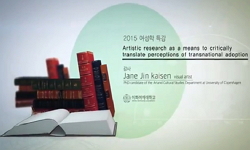The purpose of this study is to investigate the realities and perceptions of English listening education at academic high schools in Gyeongsangnamdo province to improve English listening ability on the basis of the results. For this purpose, a survey ...
http://chineseinput.net/에서 pinyin(병음)방식으로 중국어를 변환할 수 있습니다.
변환된 중국어를 복사하여 사용하시면 됩니다.
- 中文 을 입력하시려면 zhongwen을 입력하시고 space를누르시면됩니다.
- 北京 을 입력하시려면 beijing을 입력하시고 space를 누르시면 됩니다.
고등학교 영어 듣기 교육의 실태 및 인식조사 = A Study on the Realities and the Perceptions of English Listening Education in High Schools
한글로보기https://www.riss.kr/link?id=A102957676
- 저자
- 발행기관
- 학술지명
- 권호사항
-
발행연도
2016
-
작성언어
Korean
- 주제어
-
자료형태
학술저널
-
수록면
179-203(25쪽)
- 제공처
-
0
상세조회 -
0
다운로드
부가정보
다국어 초록 (Multilingual Abstract)
The purpose of this study is to investigate the realities and perceptions of English listening education at academic high schools in Gyeongsangnamdo province to improve English listening ability on the basis of the results. For this purpose, a survey was conducted with regard to teachers and students at 15 academic high schools in Gyeongsangnamdo province in connection with the four areas. The data collected were processed using frequency analysis, t-test, cross-tabulation analysis, correlation analysis, and regression analysis. First of all, the teachers` current instructional realities, perceptions, and remedial suggestions are as follows: First, as for the teachers` instructional status in the area of listening, they rarely gave listening education during regular classes mainly because of limited time due to the progress of textbooks. Second, as for the teachers` perceptions of the area of listening, they suggested that instruction in the area of listening should be emphasized in improving communicative competence in English. Some of the instructional materials for the area of listening that they regarded as ideal and, in which students felt the greatest interest included videos and popular songs. Third, as for the teachers` remedial suggestions in the area of listening, they suggested that listening instruction should be improved, specifically by developing diverse textbooks and teaching materials in the area and by distributing differentiated listening textbooks. Next, the students` current learning realities, perceptions, and remedial suggestions are as follows: First, as for the students` learning status in listening, they showed that they didn`t receive proper feedback after solving a problem in practice and most of them made no personal development of listening comprehension out of regular classes. Second, as for the perceptions for listening, the responses of students` perceptions were equal to those of teachers` perceptions. Third, as for the remedial suggestions for listening, the responses of students` remedial suggestions were equal to those of teachers` remedial suggestions. Finally, the results concerning correlation and regression analysis of the areas for teachers and students are as follows: First, as for the factors affecting the teachers` teaching skills in the area of listening, their performance in TOEIC was correlated with the skills. The findings from the regression analysis also confirmed its significant positive impact. Second, as for the factors affecting the students` learning skills in the area of listening, their experience of learning English at schools abroad or at language course centers and their performance in listening tests were correlated with the skills. The findings from the regression analysis also confirmed their significant positive impact.
동일학술지(권/호) 다른 논문
-
- 경남대학교 교육문제연구소
- 김대욱 ( Kim Dae Wook )
- 2016
-
- 경남대학교 교육문제연구소
- 김민성 ( Kim Min-seong )
- 2016
-
- 경남대학교 교육문제연구소
- 서은희 ( Eun-hee Seo )
- 2016
-
특성화고 학생의 초기부적응도식, 갈등해결전략, 외로움과의 관계
- 경남대학교 교육문제연구소
- 심세연 ( Sim Se Yeon )
- 2016




 KISS
KISS



